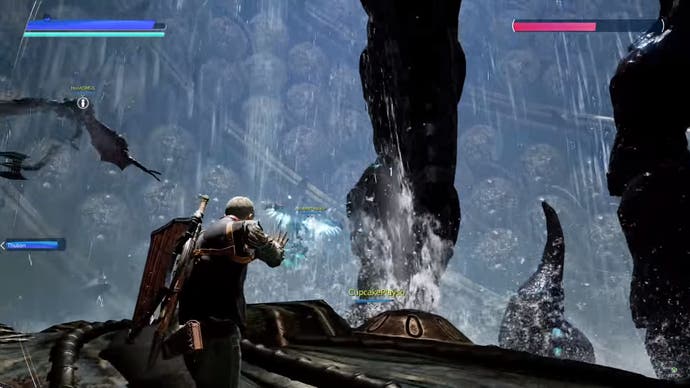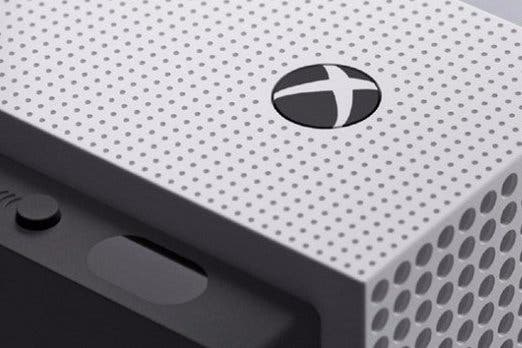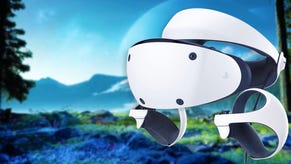Microsoft's mixed messages at E3 aren't pretty for Xbox One owners
The great teraflip-flop.
During the video for Project Scorpio, two minutes of puffery dedicated to Microsoft's bright Christmas 2017, there is a man who speaks with his mouth but betrays everything with his eyes. "This doesn't mean we're leaving the Xbox One behind," he says, but the truth is there to see as his eyes flick away from the camera. Microsoft began its E3 conference by revealing the redesigned Xbox One S - and then, it still amazes me now, closed the show by telling everyone they'd be fools to buy any kind of Xbox One.
E3 conferences are about a lot of different things, but for a platform-holder one goal is paramount: make your hardware desirable, at once keeping the owners happy and making the non-owners want to buy it. Microsoft offered up iterative fare like Gears of War 4 (very pretty) and Forza Horizon 3 (which looked amazing), alongside a look at more original hopes like ReCore and Scalebound (not a great showing, though I keep the faith). All of these games are now subject to the Xbox division's bizarre new interpretation of the word 'exclusive,' which now means cross-platform.
With little fuss, the Xbox division has split its focus over both console and PC. This may be entirely down to Microsoft's wider Windows 10 strategy, but it's also a welcome opportunity to retreat from a head-to-head battle that Redmond is losing. Xbox is moving from being a box into being a brand of PCs-in-boxes that run Windows 10, with regular hardware upgrade cycles.
In other words, the long-term future of Xbox - because it was always a Trojan horse for Windows - has suddenly moved into the short term. This is not how Xbox One was sold. Consoles are expensive and, feeling I haven't quite got value out of my Xbox One purchase yet, I watched Xbox's E3 show hoping to feel reassured about the future. I was left feeling anything but.

By its end, this conference represented a major pivot away from Xbox One, to the extent that even the Xbox One S had its debut undermined. The slimmer model is neither here nor there for existing owners, though welcome inasmuch as it will hopefully increase the overall installed base of Xbox One consoles. Rumours of a performance boost that goes beyond minor visual upgrades are apparently unfounded, but the S looks nice and the price is right. It's a good move.
A more surprising factor is its lacking the dedicated port for Kinect - you can use the peripheral with it, but this requires an adaptor. Once upon a time I believed in Kinect, thought it would produce some great experiences, and clearly Microsoft did too. This isn't the place to anatomise why the hardware failed, after a decent commercial start on 360, but it's worth remembering that Xbox One initially doubled-down on it.
We were told at various points that Kinect was essential for the console to operate (untrue), that it was a fundamental part of the user experience (which was kind of true, even if it was only to turn the thing on), and that we could expect plenty of bespoke software (oops) and general functionality across games. The calls to get rid of Kinect were there from the Xbox One's announcement and, after a disastrous launch, barely six months later a Kinect-less Xbox One model was released at a lower price. And now the second iteration of the console requires an expensive extension lead to even connect - sorry - the thing up. It's amazing how much can change in two-and-a-half years.
Xbox One S, in this sense, represents a final break with the original Xbox One vision. Something of a purer console, and one that sits nicely alongside the impressive lineup of games Xbox had to show. It is only undermined by that other change, whereby 'Xbox exclusive' now mostly means 'available on PC'. Games like Halo 5 are the exception (Spencer says this is because it began development before the current strategy was in place), but much-anticipated Xbox One titles like Sea of Thieves and Scalebound will be released on PC.
Simply on this alone, you could say the real message of the Xbox E3 conference was "buy a PC." But then came the hammer blow of Project Scorpio. The presentation ended with the Xbox division promising that, in Christmas 2017, it would release its most powerful console yet.
Digital Foundry does its thing on the specs elsewhere, but I'll stick with the talking heads in the video. "The most powerful graphics processor that's been put into a game console to date... very powerful GPU.... the highest res, the best frame-rate, no compromises... 4K gaming.... true 4K resolution...we can render at 60Hz, we can render fully uncompressed pixels... the highest-quality pixels anyone's seen..."
"This is the 'we heard you' console."
And then my man. "This doesn't mean we're leaving the original Xbox One behind," he says. Others add to the point, claiming the two machines are somehow equivalent, part of the same family. The key marketing line is "no-one left behind," a slightly perverse echo of military terminology designed to make this change seem like a team effort, which carries the unfortunate implication that Xbox One owners are horribly wounded from the experience. No comment.
Shortly after the announcement, Shannon Loftis, a senior Xbox figure, appeared to confirm that developers can develop Scorpio-only titles if they choose. A swift piece of record-correcting followed from Aaron Greenberg on twitter:
"No Scorpio exclusives." It's there, plain as day. Microsoft's message has since dithered in scenes reminiscent of those around the Xbox One's fluffed reveal: Phil Spencer, in an interview published yesterday, said those without 4K TVs wouldn't see the benefit of Scorpio, while elsewhere he stated developers will be free to use all that extra power for more than a bump in resolution. What to believe?
Maybe Kinect isn't the only thing on the fire. The Xbox One seems to have been re-imagined as the entry-level device for a new Xbox strategy, one borne out of the huge leaps in CPU/GPU technology that are now leaving consoles behind from the day they're released. Xbox will now be a platform independent of hardware, one focused on simultaneous PC releases with the current 'box' acting as a streamlined gateway to the goodies.
It's not a bad idea at all but, two-and-a-half years since the launch of Xbox One, for me it sticks in the craw - for the simple reason that I have a PC, and bought an Xbox for the kind of experiences which, historically, weren't available on PC. I expected the Xbox One to deliver unique software rather than become a second-rate PC. Xbox One development, in terms of games developed for and optimised for that specific hardware configuration, is now dead. Any developer with a brain is now looking to PC and Scorpio - with some workable version for the installed base of Xbox One owners included.
The simple truth is that the messages are contradictory. If Scorpio is truly revolutionary then there's no way it can't leave Xbox One behind. What would be the point in it otherwise? Do we believe the only differences between games will be resolutions and graphics settings? Do we believe that, when Scorpio is on the market, Xbox will continue to honour the 'no exclusives' promise?
The transition from one generation to the next has traditionally been a slow one, for the simple reason that consoles like PS2 and Xbox 360 had large installed bases still hungry for games. How many development studios, right now, will be giving any thought to the few million Xbox One owners when planning games that will be finished in 2018, 2019 and beyond? Will even Microsoft Game Studios find itself torn between Scorpio and the bastard child?
Xbox is in an invidious position, not least because the goal is now to become a PC brand, and it has put itself in a dilemma that damages brands. Most famously, Sega, with various hardware iterations on the hugely-successful Mega Drive, moved focus from supporting the basic console before it should have, spread software teams over the various SKUs, and through this the true next-generation console's development and software support also suffered. PlayStation destroyed the Saturn, but Sega helped. This is not the Xbox situation, and Microsoft has deeper reserves than Sega ever dreamed of, but these things echo for a reason.
A frequent counterpoint to this is that we wouldn't feel this way about an iPhone or the latest tablet. While it's true that iterative hardware cycles are standard business, these much-vaunted examples are also items that see daily if not hourly use - and that's without even touching on the various ways they're sold and traded-in. A console's a much more traditional prospect, one where the consumer whacks down a lot of money - and the Xbox One was a now-unbelievable $499/£429 at launch - in return for which they expect software support over a reasonable period of time.
So we return to Xbox's E3 conference 2016, in which Microsoft showed some games and a newer model of Xbox One, before ending by telling anyone they'd be a fool to buy an Xbox One in the next 18 months. And by the way, the whole business model has changed.

The gap between the original Xbox and Xbox 360 ended up as four years - which will be similar with Scorpio and Xbox One. But the 'abandon ship' call has come two-and-a-half years after Xbox One's launch, and we're also told that Scorpio is definitely not actually the next console, promise - because no-one is left behind. Confused? Me too.
At this E3, Microsoft abandoned the original Xbox One vision in favour of another future, under the sign of Scorpio, in the course of which those who bought into the Xbox One have become second-rate consumers. The Xbox One is no longer an aspirational platform, somewhere you can expect unique or best-in-class experiences. It is now the Sainsbury's Basics entertainment system.
(In the interest of fairness, it's worth pointing out that Sony, by refusing to talk about PlayStation Neo at E3, has only delayed having to face many of these same questions. With a narrower power gap between basic and premium consoles, and no PC alternative, the situation for PS4 owners isn't quite as stark - but as Martin pointed out recently, it's still uncomfortable.)
I watched the Xbox conference looking for reassurance. Now I think the Xbox One will go down as a misfire in video game history and, in the longer term, a piece of hardware that hastened the end of its own market.
The future outlined at E3 makes Xbox One, if not obsolete, at the very least an unattractive option. Consoles are always behind the PC technology curve, which is ameliorated by their longevity and software. Xbox One is now not only just a weak PC, but one whose future software will be available on real PCs, and to top it off a new target SKU has been announced 18 months before release.
Businesses have certainties - like units of hardware sold - but also more ineffable factors such as trust. A great brand is a powerful thing, and a great brand is what Xbox aspires to be. The future that Xbox has laid out depends on it being, beyond hardware, a brand that can create a market across different devices. Xbox One, Xbox One S, Xbox Apps, Xbox Scorpio - and all of the games running on PC too.
You never wonder about why Nintendo is in the games business - but for Microsoft, it's always been more strategic. Xbox offered up lots of answers and predictions of the future at this E3. But it left me with one big question: why will anyone need an Xbox?




-3-31-23-screenshot.png?width=291&height=164&fit=crop&quality=80&format=jpg&auto=webp)





